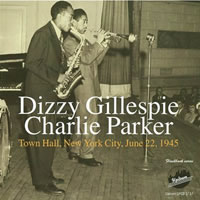Choisissez un style Jazz pour accéder à une sélection d'albums...
[ Dizzy Gillespie and Charlie Parker ]
Style : Bebop
Date de Sortie : 21/06/2005
It's an unlikely story, but the most stunning jazz discovery in a decade - the Rosetta Stone of bebop - was unearthed at an Elks Lodge in Chelmsford, Mass. The trove consisted of seven 12-inch acetate discs, on which was recorded a 40-minute concert by Dizzy Gillespie and Charlie Parker at Town Hall in New York on June 22, 1945.
That date is significant. The two musicians - Diz and Bird, as the world would soon know them - were still fairly obscure. (Most of the audience had probably come to hear other musicians on the bill, especially the tenor saxophonist Coleman Hawkins, who didn't show up.) The first Gillespie-Parker record had been in stores for only a few weeks. The second, produced on May 11, hadn't yet been released.
In short, these discs vividly transport us to the birth of modern jazz.
In those days of the 78 r.p.m. single, studio sessions were limited to about three minutes per song, solos to 15 or 20 seconds. At the Town Hall concert, the musicians were free to play the tunes - "Bebop," "Groovin' High," "Hot House," "A Night in Tunisia" and "Salt Peanuts," all jazz anthems by the end of that year but at the time still unknown - for twice as long, and at a furious tempo. Solos went on for two minutes or more, and they're blazing - Diz scaling heights on trumpet, Bird hitting speeds on alto sax, that no one had heard before. The studio recordings, great as they are, sound mellow, even quaint, by comparison.
Now, 60 years after the concert, the small jazz label Uptown Records has sonically restored the acetates and transferred them to a CD titled simply "Dizzy Gillespie-Charlie Parker: Town Hall, New York City, June 22, 1945."
Vous avez des informations supplémentaires ?
![]() Cliquez ici pour compléter cet article
Cliquez ici pour compléter cet article






